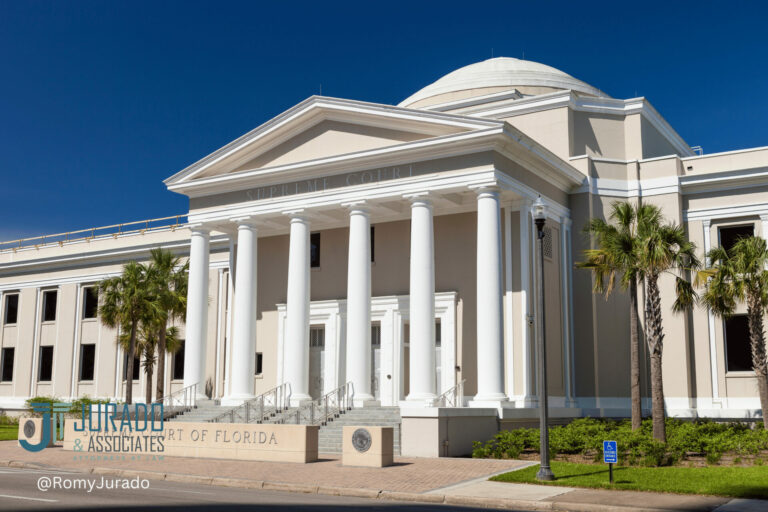Una de las facetas más importantes del proceso de sucesión de Florida es elegir a un representante personal. Como sugiere el término, un tribunal de sucesiones otorga autoridad a un representante personal para actuar en nombre del patrimonio del difunto y realizar varias tareas para administrar la distribución de los bienes sujetos a sucesión.
Por ello, viene bien preguntar: ¿es posible elegir a un no residente como representante personal en Florida?
Esta guía, preparada por las abogadas Romy B. Jurado y Diana L. Collazos le brindará una certera respuesta.
Veredicto: ¿Puede Actuar Un No Residente Como Representante Personal en Florida?
Bajo circunstancias específicas, la ley de Florida permite que un no residente de Florida actúe como representante personal para administrar un patrimonio sujeto a sucesión dentro del estado. Sin embargo, no se aplica a todos los casos.
Vale la pena señalar que un gran número de personas cometen este error al redactar un testamento, ya sea al nombrar a un amigo cercano que vive en otro estado o a un abogado de otro estado como su representante personal.
En última instancia, estas personas no calificarán para cumplir el rol.
¿Qué dicen los estatutos sobre elegir a un no residente como representante personal?
Los Estatutos de Florida §733.304 establecen que “una persona que no esté domiciliada en el estado no puede calificar como representante personal a menos que la persona sea:
- Un niño adoptado legalmente o un padre adoptivo del difunto
- Mantenga relación por consanguinidad lineal con el difunto
- Un cónyuge o un hermano, hermana, tío, tía, sobrino o sobrina del difunto, o alguien relacionado por consanguinidad lineal con tal persona; o
- El cónyuge de una persona calificada bajo el mismo estatuto”.
Como es claro, en la mayoría de casos no será posible asignar a un no residente como representante personal en Florida. Por ello, es importante trabajar con un abogado de sucesiones a la hora de armar su plan patrimonial, para evitar estos grandes errores.
¿Qué Sucede Si El No Residente Como Representante Personal Cumple Con Los Requisitos Legales?
Si bien elegir a un no residente como representante personal en Florida es complicada dadas las disposiciones legales anteriores, también se debe tomar en cuenta lo siguiente:
Los Estatutos de Florida §733.303 (1) establecen que “una persona no está calificada para actuar como representante personal si la persona:
- Ha sido condenado por un delito grave
- Ha sido condenado en cualquier estado o jurisdicción extranjera por abuso, negligencia o explotación de una persona mayor o un adulto discapacitado (como se define en Fla. Stat. §825.101)
- Es mental o físicamente incapaz de realizar las funciones requeridas
- Si es menor de 18 años”.
Por lo tanto, si la persona designada como representante personal del difunto no cumple con los requisitos básicos ni con los requisitos siguientes, el tribunal que lleva el caso designará a una persona calificada en base a un orden de preferencia legal.
¿Qué sucede si no se puede elegir a un no residente como representante personal?
En consecuencia, los Estatutos de Florida §733.301 establecen el orden de preferencia específico que se aplica a las sucesiones testadas (cuando hay un último testamento) o intestadas (sin último testamento).
El orden legal de preferencia en las sucesiones testadas viene a ser…
- El representante personal, o su sucesor, designado por testamento o en virtud de un poder conferido en el testamento
- La persona seleccionada por una mayoría de las personas con derecho a la herencia
- Un heredero (beneficiario) según el testamento (si se elige más de un heredero, el tribunal puede seleccionar al mejor calificado).
¿Qué sucede si no se puede elegir a un no residente como representante personal en una sucesión intestada?
Si el difunto murió sin un último testamento y su patrimonio está sujeto a sucesión, la distribución de los bienes se hará de acuerdo con las leyes de intestado de Florida.
Según lo dispuesto por los Estatutos de Florida §733.301 (1)(b), el orden de preferencia en las sucesiones intestadas es:
- El cónyuge sobreviviente
- La persona elegida por mayoría en interés de los herederos, o
- El heredero más cercano en grado (de parentesco).
En caso de que más de uno de los parientes consanguíneos o herederos del difunto solicite servir como representante personal, el tribunal que lleva el caso seleccionará a la persona que considere más idónea para cumplir el papel.
Vaya Más Allá De Elegir a un No Residente Como Representante Personal en Florida
Como puede ver, este es un gran error. Evite este y otros contratando a un abogado de sucesiones, tal y como la ley lo requiere. No pierda tiempo y llame a las abogadas Romy B. Jurado y Diana L. Collazos al (305) 921-0976 o envíe un correo electrónico a [email protected] para programar una consulta.












